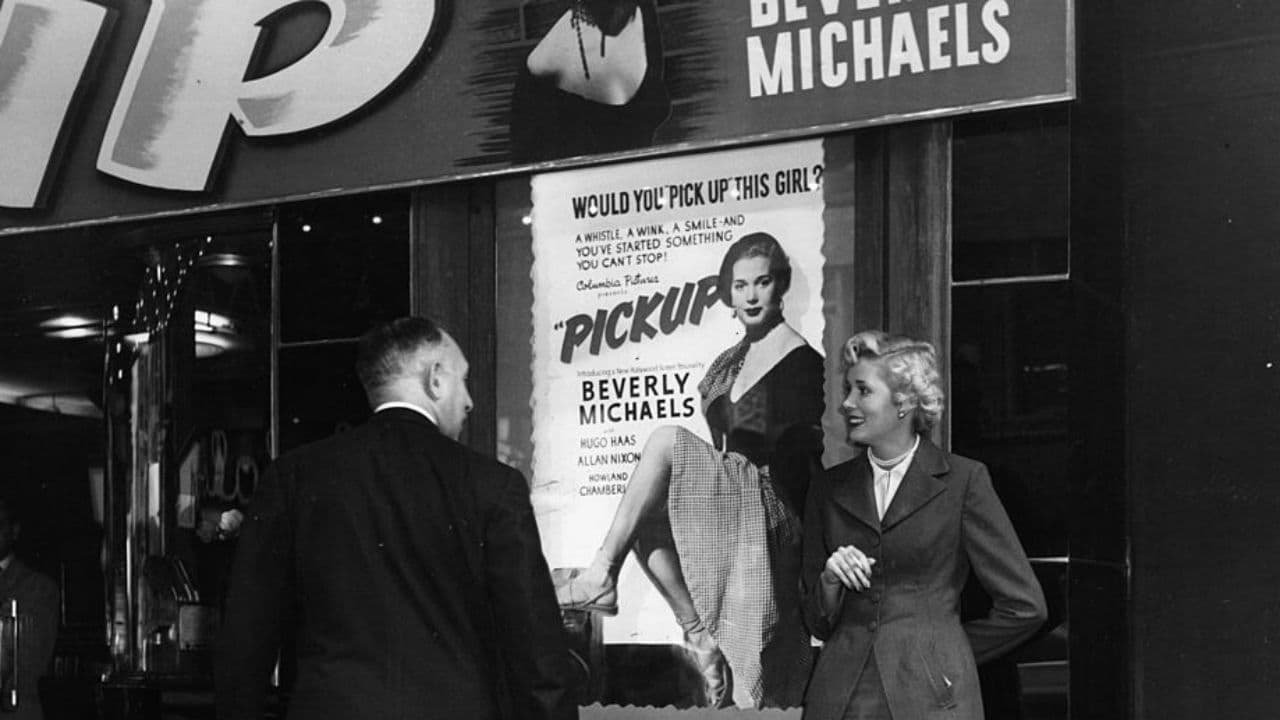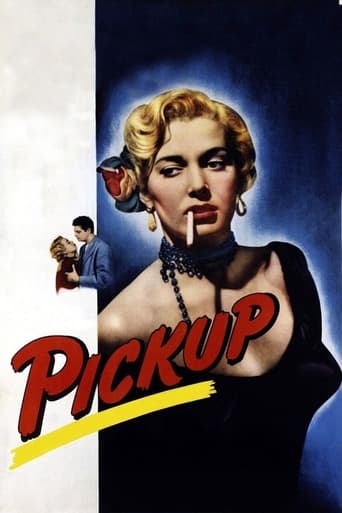Nonureva
Really Surprised!
SparkMore
n my opinion it was a great movie with some interesting elements, even though having some plot holes and the ending probably was just too messy and crammed together, but still fun to watch and not your casual movie that is similar to all other ones.
ChicDragon
It's a mild crowd pleaser for people who are exhausted by blockbusters.
Clarissa Mora
The tone of this movie is interesting -- the stakes are both dramatic and high, but it's balanced with a lot of fun, tongue and cheek dialogue.
mark.waltz
She's opportunistic, bad tempered, trampy and possibly murderous. She's Beverly Michaels, whose tough girl image started off when she got into a fist fight with Van Heflin in the 1949 MGM melodrama "East Side, West Side", and as one of the tallest women in Hollywood in the 1950's after Hope Emerson, she's a force to be reckoned with. This story centers on Hugo Haas, a small town whistle stop train maintenance person who, as a widower of two years, longs to find someone to marry but makes the wrong choice when he meets Michaels in a greasy spoon and begins to spend time with her. After she's kicked out of her apartment for not only not paying rent but selling items which belonged to the landlady, Michaels makes a beeline for Haas, and while we don't get to see the events which lead up to a proposal, they are soon married, as evidenced by the presence of a wedding cake on a messy table in Haas's humble cabin right after the ceremony. She's grumbling from the start, and when a young acquaintance (Allan Nixon) of Haas's stops by, it's apparent that she's in the mood to cheat on her new hubby, and maybe even arrange for his accidental death, falling over a cliff near the whistle stop he takes care of.A mesmerizing and fun piece of pulp trash, "Pickup" makes no bones about the fact from the moment you see her that Michaels is no good. She's one of those entitled broads that thinks that she can use her womanly wiles to get a man, even if its one she personally abhors. At certain times, there are hints that deep down, she cares for him in a fatherly like way, but there's obviously no love there. When he suddenly loses his hearing after having some sort of recurring seizure, Michaels realizes that she's trapped in a loveless marriage with a sick old man, and decides to manipulate Nixon into doing her bidding to get rid of him. But a sudden return of his hearing causes Haas to learn the truth about his wife, and he brilliantly leads her and Nixon on in believing that he's still deaf, even in one scene where she insults him with laughter directly to his face, and he laughs back, even though he knows exactly what she's saying. There are some great photographic effects when Haas has his seizures and when he learns the truth about what is going on. As a viewer of their unfixable situation, the audience gets to see through Haas's point of view the torment he faces, and it's absolutely riveting,Even so, there's an element of unbelievability that Haas could be so naive as to not see through Michaels' machinations, especially with old pal Howard Chamberlain looking in and giving his own warnings, and simply the obnoxious way that Michaels acts when she can't get her own way. But the performances of Haas and Michaels are amazing, especially Haas who brilliantly acts simply by staring off into space and revealing through his eyes how let down he feels, especially realizing what a complete fool he is. Chamberlain, too, is outstanding, reminding me of an older John Qualen. This is a great example of how a simple man can be pulled in over his head, like Edward G. Robinson in "The Woman in the Window" and the cuckholded husbands of Barbara Stanwyck and Lana Turner in both "Double Indemnity" and "The Postman Always Rings Twice". Also standing out in a small role as Michaels' friend is Jo-Carroll Dennison. It's nice to read that "bad girl" Michaels had a happy and normal life after leaving the movies, unlike a similar 1950's vixen, Barbara Payton, whom I often mistook for Michaels, and vice versa. I won't make that mistake again.
bmacv
Was Fritz Lang a fan of Hugo Haas? Distinctive elements of both Lang's Clash by Night and Human Desire are foreshadowed in Haas' Pickup (there's also an element left over from Jean Renoir's Woman on the Beach). But Czech-born Haas, a starvation-budget auteur of the 1950s, lacked the depth and style of his European colleagues. That's not so terrible, except that he also lacked their nerve, and as an actor rooted in comedy, the nerve for noir.Towering Beverly Michaels finds herself on queer street and spots in lonely widower Haas a way off of it. He mans a milk-run railroad pit-stop but has $7300 in the bank; she knows because she snuck a look at his passbook and married him for it. Trackside life soon proves a drag for the high-maintenance blonde, however, and she nags him to fake a disability so they can take early retirement and move back to the comparatively bright lights of town; she also strikes up a romance with his relief man Allan Nixon.Fate intervenes when Haas is suddenly struck deaf, putting his pension within reach. But just as suddenly he gets a face full of fender on a trip into town and regains his hearing – unbeknownst to his wife and his assistant. He listens impassively as they boldly exchange endearments, and just as mutely when Michaels works the flirtatious talk around to murder....The strongest hand Haas has going for him in Pickup is Michaels, his off-screen wife at the time. Her grasp of the gold-digger's ways was as firm as that of any actress, and her physical stature was exceeded only by Hope Emerson's. But otherwise the film's cheapness shows; apart from scenes at a carnival which look like stock footage, the action is confined to Haas' shanty and a stretch of railroad track. And, having indulged himself in a masochistic fantasy, Haas seems too timid to follow it where it seems bound to go, taking abrupt refuge in a jarring change of tone just at the end. And that end, too, foreshadows the final shot of another Beverly Michaels film, Russell Rouse's Wicked Woman: Her bags packed, she hits the road.
secragt
The reviewer who said "Citizen Kane it ain't" got it right. This is lowbrow stuff to be sure, but for what it is, Haas demonstrates a surprisingly keen eye for both dialogue and characterization, two things supremely lacking in the cheaper and lesser BAIT produced a few years later. Best of all, this is a highly entertaining ride, with a solid and credible performance by Haas as the pigeon who all but begs for a plucking until he sees the light (or rather hears the dark) when he overhears the plotting and venomous bile directed at him by his conniving and venal wife, who believes him to be deaf.Trumping all however is the bravura dominatrixesque performance of Ms. Michaels as the throaty pointy-bra'ed femme fatale. Here's one of the few broads I've ever come across who might be able to actually compete with Ann Savage's mouthy and devouring DETOUR chippie for supremacy over a castrated male race. And leave the male species begging for more.Also in the movie's favor is a reasonably tight storyline which features some nice twists and reveals with great gusto the true depths of treachery to which Michaels gleefully stoops to get her $7300 out of Haas. Again, this isn't DOUBLE INDEMNITY and it certainly isn't Shakespeare but it's charmingly pulpy and has an agreeably creamy evil nougat centre.
telegonus
Citizen Kane it ain't, but Pickup isn't nearly as bad as one might think. Actor-director Hugo Haas deserves better, and I hope I can help the poor man (long departed) out. Haas,--no, I won't go into his career and background--let's just say the man had the reputation for being an okay actor, but as a director he was considered a sort of Central European version of Ed Wood. Pickup is about an older man, played by Haas, whose life is made a wreck of and nearly ruined by a toothy, gum-checking but withal irresistible blonde, portrayed by the unforgettable Beverly Michaels. The girl is, to be as genteel as possible, a worthless tramp, and nasty and stupid in the bargain. She plays with her adoring and naive lover like a cat with a mouse, and has an affair with a much younger man on the side. Amazingly, no one is murdered in the course of this film, which is actually at times quite sweet. Look, every novelist cannot write The Brothers Karamazov and every composer cannot write the Eroica, so why put down poor Mr. Haas whose only sin as an artist that I can tell is that is that he isn't Orson Welles. The man had a heart and soul, and this comes through in many scenes. He understands cruelty, too, and the woman in this film is, for all the melodrama, a not innacurate portrait of a certain kind of low-down broad who, if one were to show her videotapes of her inflicting her standard dose of pain on whoever the poor dope fool enough to get involved with her at the moment is, would shrug, light a cigarette and say, "Well, he was asking for it, wasn't he?". I'm not too sure about the character Mr. Haas plays in this film, but there is a kernel of truth in the mean little tale he tells; tacky though it may be, there's life in it nonetheless, which is good enough for me.

